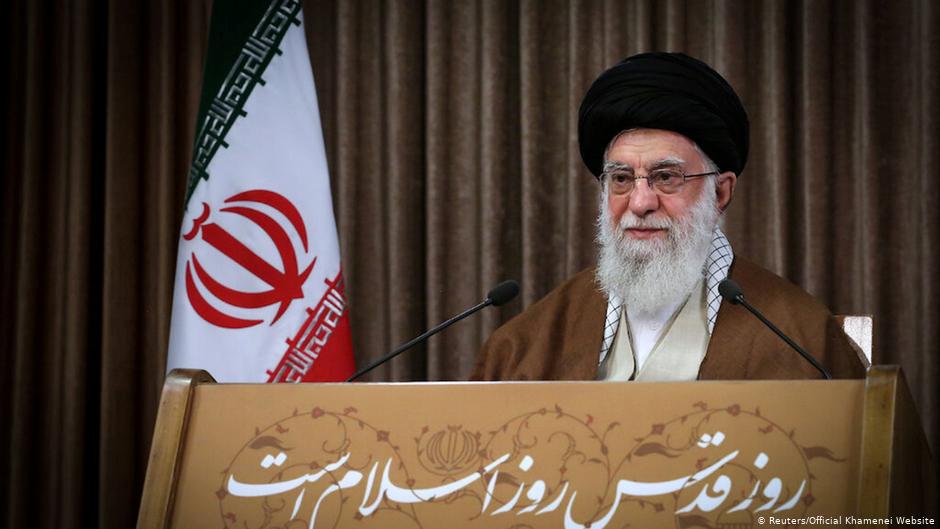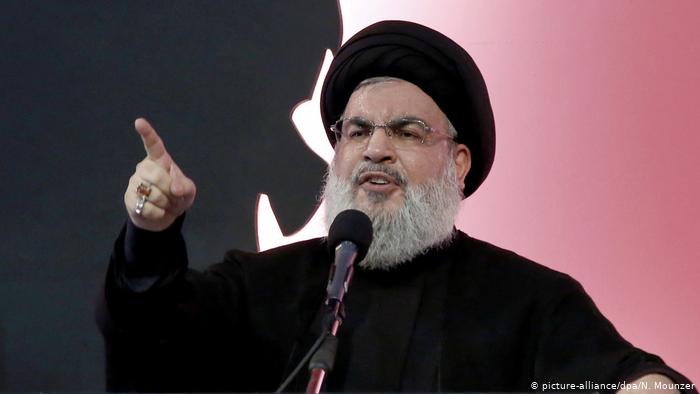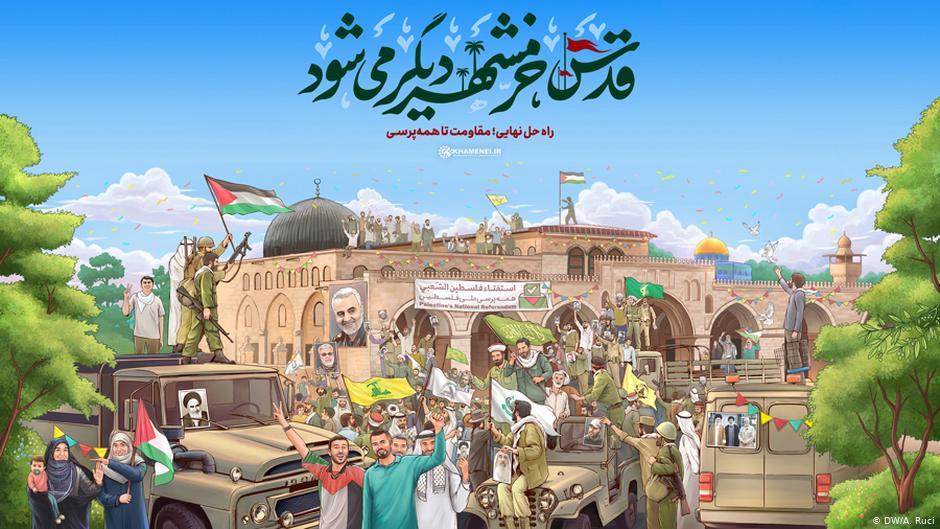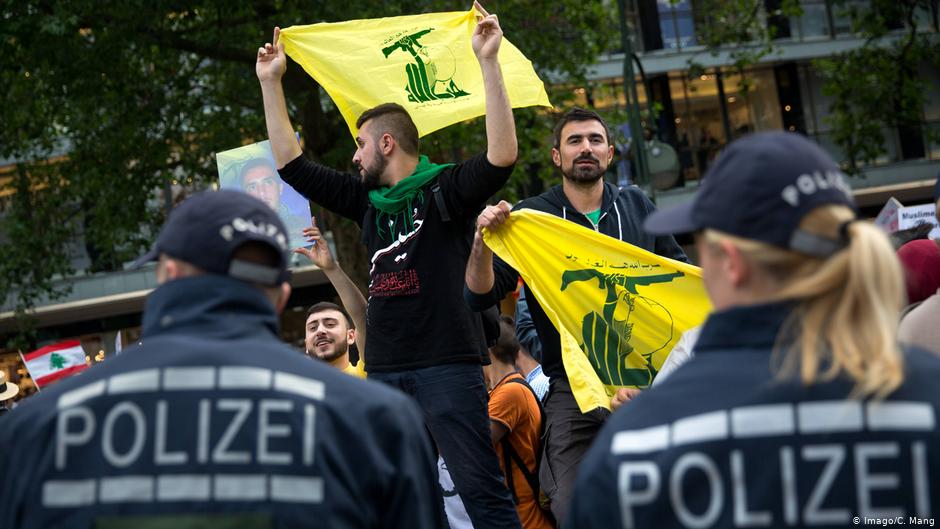Khamenei's Final Solution provocation to mark Quds Day

The power of some legends is eternal. Told by someone like Hassan Nasrallah, leader of Lebanon's Hezbollah, such narratives evolve into an examination of the current political situation and ensuing instructions for his followers.
On 8 May, Nasrallah gave a long-awaited speech on his own TV station Al Manar, which many had been eagerly anticipating. He was confident that his words that evening would be received with interest not only in Lebanon and Iran, but also in Germany.
Having broken his fast, Nasrallah had a lot to announce from his hiding place that night: about the on-going Lebanese crisis, the deadly coronavirus that is rampant in his country, and about the ban on his followers' activities in Germany, which the German Minister of the Interior Horst Seehofer (CSU) had announced the previous week.
Location of the legend: a bus station
Nasrallah used a Shia legend to illustrate these current crises and disasters: not only Hezbollah, but the entire "axis of resistance" currently finds itself in the valley of Abu Taleb, just as the beloved Prophet Muhammad himself once did. It was thus that the leader of Hezbollah described the situation of his own party in Lebanon, of his mentors in Tehran, and of his followers in Germany.
"Axis of Resistance" is a term synonymous with all Shia activists and paramilitaries worldwide. After this speech devout Shias immediately realised the gravity of the current situation – and what needs to be done.

The valley no longer exists today. Nowadays this place of Shia mythology is a bus station not far from Kaaba and the Great Mosque in Mecca. The fact that such a profane fate has been bestowed upon this sacred place, which is steeped in history for the Shia, is due to the fact that Saudi Arabia's ruling Wahhabis consider the Shia narrative to be pure nonsense – so much fake news.
As the Prophet, so are we all besieged
According to legend, the valley turned bus station, belonged to Abu Taleb, father of Ali, the first Imam of the Shia, and an uncle of the Prophet. In 617 he was called upon to save his threatened and defenceless nephew. Back then, Muhammad had been preaching his religion for seven years, claiming that he was God's messenger.
Initially, the tribal leaders and powerful men in Mecca did not take Muhammad and his mission seriously, preferring to ignore or ridicule the man who walked through the streets quoting Koran verses. As support for Muhammad grew, however, they tired of the troublesome preacher. The situation threatened to escalate, lives were in danger, and the Prophet and his small group of followers were forced to go into hiding.
Abu Taleb, Muhammad's uncle, granted the small community refuge in his valley. For three years, the Prophet and the new converts eked out a difficult existence under strict siege conditions. Food and water were smuggled into the valley at night.
As time went on, those against Muhammad became less unified in their opposition towards him – they were at a loss to know how to deal with him. Finally, the group was allowed to leave the valley. As the blockade was lifted, the triumphal procession of the new religion began, and the rest is history.
God is with the patient
Having related this legend, Nasrallah cited in his speech the Koranic verse that Muhammad is said to have received on the occasion of this three-year siege:
يَا أَيُّهَا الَّذِينَ آمَنُوا اسْتَعِينُوا بِالصَّبْرِ وَالصَّلَاةِ ۚ إِنَّ اللَّهَ مَعَ الصَّابِرِينَ)
"O believers, strive for patience, perform the prayer, God is with the patient"
In other words, victory is certain, but triumph requires perseverance: therefore be patient as the beloved Prophet once was.
Nasrallah's speech is in truth an about-face. He sees the "axis of resistance" in a state of siege, and he advises patience. This also applies to his followers in Germany.
For the first time in its existence, Hezbollah cancelled the so-called Al-Quds demonstrations this year. Not only in Lebanon, but worldwide, no marches against Israel should take place on this last Friday of the month of Ramadan - not even in Berlin.
An escalation with Germany would obviously be inopportune.

Nasrallah's reaction to the German Minister's ban was surprisingly mild. Not a word of condemnation or complaint that Horst Seehofer had called Hezbollah a terrorist organisation. The Party of God has no members in Germany, Nasrallah said, and called on all Lebanese in Germany to abide by the law. The days of verbal offensive would seem to be over. Slogans of perseverance are now the order of the day.
Mentor Khamenei speaks of a "Final Solution"
In doing so, the Hezbollah leader openly and unambiguously contradicted his mentor and idol, the Iranian revolutionary leader Ali Khamenei, who not only supports Hezbollah, but the entire "axis". Khamenei still sees himself on the offensive: he is seeking escalation, at least verbally. On the eve of Al-Quds Day, the religious leader of Iran put a poster online on his official website depicting a "free" Palestine, using the Nazi euphemism "Final Solution".
The poster, published in Farsi, Arabic and English, was entitled: "Palestine will be free. The Final Solution: resistance until the referendum". Below it is a drawing of soldiers from Islamic countries waving Palestinian flags and an image of Iranian General Soleimani, who was killed by the USA. In the foreground is the Al-Aqsa Mosque on Jerusalem's Temple Mount, in the background the Dome of the Rock.
Intentional provocation
The use of the term "Final Solution" was neither a faux pas nor a coincidence. Khamenei's most important foreign policy advisors, such as Ali Akbar Velayati or Kamal Kharrazi, are graduates of U.S. universities. They know what emotions the word arouses in the Western public in connection with Jews. Khamenei knows that too. The provocation was intentional. The anticipated strong reactions from abroad were something he was looking forward to.
And they were quick to occur. Immediately after the provocation, the White House, U.S. Secretary of State Mike Pompeo, EU chief diplomat Josep Borrell and, of course, Israeli Prime Minister Benjamin Netanyahu reacted as expected. And all condemned Khamenei's choice of words. The calculated escalation took its course.
Shortly after the publication of the "Final Solution Poster", Benjamin Netanyahu tweeted that the idea of implementing the "Final Solution" against Israel, recalled the Nazis' "Final Solution" for the annihilation of the Jewish people. Immediately, as if it had just been waiting for it, the news agency Fars reported Netanyahu's reaction with visible relish. Fars is the most important propaganda organ of the Revolutionary Guards. The guards themselves published their own Israel Declaration, in which they claimed to have evidence for the imminent disappearance of "Zionist rule in occupied Palestine".
At noon on Al-Quds Day, Iranian television then broadcast Khamenei's speech on Israel. And here the religious leader went even further: "The Zionist entity" is like the coronavirus that has attacked mankind, he declared and called on the world to fight against "this entity".
Khamenei or Nasrallah, who was right?
But why this strange provocation, why this language, why is Khamenei deliberately driving Iran further into international isolation? The fight against the state of Israel is practically part of the DNA of the Islamic Republic – a state called Israel does not officially exist – but Khamenei's verbal enmity towards Israel went further than usual this year.

There is a solid domestic political reason for this: his regime is indeed in the "Valley of Abu Taleb", to quote Hezbollah leader Hassan Nasrallah. The "axis of resistance", i.e. the paramilitary Shia, is indeed under massive pressure: in Lebanon and Syria, Israel bombs pro-Iranian groups – on a regular basis and with Russia's tacit approval. In Iraq, the new Prime Minister Mustafa Kadhimi wants to disarm the Shia militias. And in war-stricken Yemen, misery continues, without any major change at the front.
Motherland at a dead end
And Iran, the motherland of this "axis", is itself in a hopeless situation. It has no foreign trade to speak of. The sanctions are perfect, banking connections with Iran are non-existent. Even the border with neighbouring Iraq is currently closed due to the corona pandemic. Nor is there any exchange of goods with this ally either.
Fearing that in this impasse someone might propose entering into talks with the USA, Khamenei is adopting a harsher tone. Anyone who claims that Iran is under siege, is running the enemy's business, he said last Monday in a video addressed to students loyal to the regime. Khamenei encouraged them to fight anyone in the country who dared "sow doubt" or demand negotiations with America.
Iran was the only state in the world that protested against the German ban on Hezbollah activities. Even the Lebanon's Hezbollah government, which includes two Lebanon's Hezbollah ministers, remained silent. For Khamenei, defamatory and apocalyptic language seems to be a way of preventing the Islamic Republic's downfall. Will it work?
Ali Sadrzadeh
